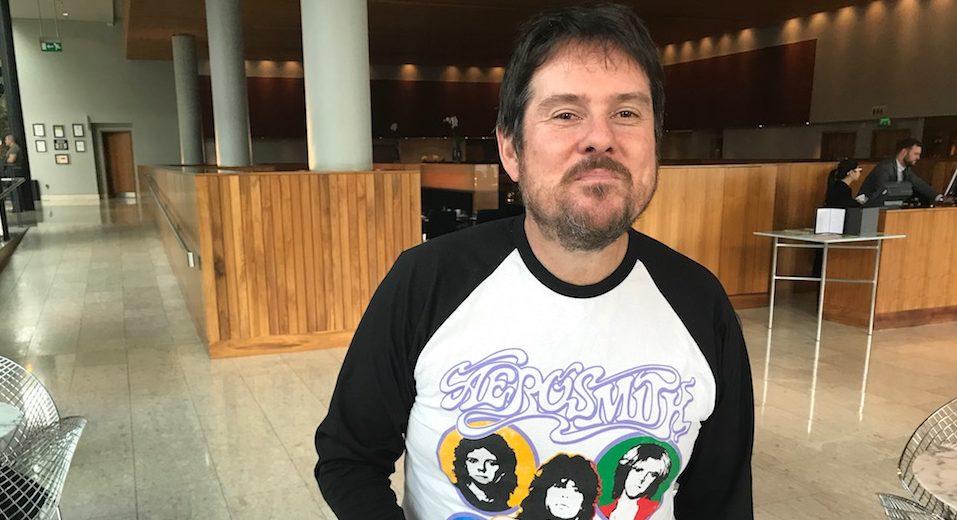Steve Mascord is a rugby league writer for Fairfax Media and author of “Touchstones”, a memoir in which he documents his obsessions with rugby, rock ’n’ roll and the road. He is currently in Australia for the 2017 Rugby League World Cup.
Mascord has travelled the world to promote his book and will be in Australia for about two months. “This will be the longest I have stayed in one place for a while. But once the World Cup starts I will be on the road again. There are only two games in Sydney,” Mascord said on a recent episode of Mediaweek’s Seven Days podcast, where he was a guest panellist. “With the book I am also trying to work in a few functions along the way.”
Mascord got his break in the media industry as a cadet journalist at AAP in the 1980s. In the time since, he has covered rugby for Fairfax and News Corp. He is known as a specialist in international rugby league. “It’s like being an expert in Zimbabwean vacuum cleaners – it’s a very obscure interest,” Mascord joked. “We are all hoping Zimbabwean vacuum cleaners and international rugby league get more popular over the coming years.”
For the first time since 1986, Mascord didn’t have a media pass for the 2017 season of the NRL Premiership, he told Mediaweek. Instead he watched all the games this season – including the grand final – in different parts of the world and blogged about them for Fairfax mastheads online. Mascord has been writing about rugby since the 1980s. According to him, the coverage that the sport receives in Australia has “matured”.
“The main thing that’s changed in the coverage of the game is the detail,” he stated. “When we were kids, we would listen to two radio stations and read the papers.
“I used to keep a whole season’s worth of sports columns in my locker with my footy cards. But now there is a 24-hour station on Foxtel and the internet coverage is blanket.
“A lot of people decry the fact that the coverage is more sensationalist and is more about the player’s private life. But actually, the biggest difference to me is quite the opposite. There’s more actual discussion on the football tactics, as well as the strengths and weaknesses of each player. In all my time as a rugby league writer, those things were considered boring.
“The first paragraph was never about [tactics]. It was always about someone bagging someone or controversy.”
Print rugby league writers like Phil “Buzz” Rothfield that Mediaweek has spoken to in the past have asserted it is getting more difficult for journalists to get access to players. Mascord agreed with this, but said that the problem is partly self-imposed.
“A part of the reason it has been allowed to happen is that there has been a lack of unity among the print media for the last 20 years, where a lot of guys hated each other. So they weren’t going to work together for the common good. They were happy to try to get one up on each other and build relationships on the side,” Mascord said. “Looking at it from a business perspective and NRL’s point of view, print media is less significant and is less value to the business than it has ever been in the past. Rights are there to be leveraged and access is something you can now sell via your social media platforms and via your rights holders.
“There’s no reason for the process to reverse.”
NRL is confined within the national boundaries, because its approach to international media and coverage is very strict, Mascord said.
“My friends from England come out here and try to get accreditation to go to games, but it’s like getting into Fort Knox. The sport in this country doesn’t have that outward-looking perspective. I was recently at Toronto Wolfpack (a Canadian professional rugby league club). They fly in journalists from magazines that might have a readership of 2,000 from Northern England. They are kids on very little money, whose audiences are tiny, but they’ll fly them in to lead the way and show that they take the brand and competition seriously.” This approach has allowed the club to get attention from the mainstream media in Canada as well and develop a following in overseas markets, Mascord said.
Sporting bodies in Australia can learn a thing or two from the NFL in the US, he said, where the media has easier access to the game and its talents, and international media are encouraged to get involved.
—
Mascord joined Mediaweek’s James Manning and Kruti Joshi on a recent podcast. Listen online or subscribe here.
